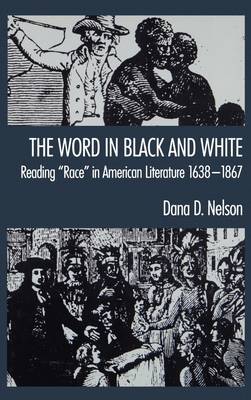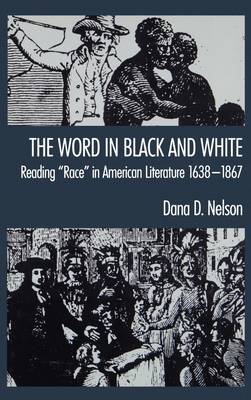
Door een staking bij bpost kan je online bestelling op dit moment iets langer onderweg zijn dan voorzien. Dringend iets nodig? Onze winkels ontvangen jou met open armen!
- Afhalen na 1 uur in een winkel met voorraad
- Gratis thuislevering in België vanaf € 30
- Ruim aanbod met 7 miljoen producten
Door een staking bij bpost kan je online bestelling op dit moment iets langer onderweg zijn dan voorzien. Dringend iets nodig? Onze winkels ontvangen jou met open armen!
- Afhalen na 1 uur in een winkel met voorraad
- Gratis thuislevering in België vanaf € 30
- Ruim aanbod met 7 miljoen producten
Zoeken
The Word in Black and White
Reading Race in American Literature, 1638-1867
Stephanie Nelson, Dana Nelson, Dana D Nelson
Hardcover | Engels
€ 131,45
+ 262 punten
Uitvoering
Omschrijving
Nelson provides a study of the ways in which Anglo-American authors constructed "race" in their works from the time of the first British colonists through the period of the Civil War. She focuses on some eleven texts, ranging from widely-known to little-considered, that deal with the relations among Native, African, and Anglo-Americans, and places her readings in the historical, social, and material contexts of an evolving U.S. colonialism and internal imperialism. Nelson shows how a novel such as The Last of the Mohicans sought to reify the Anglo historical past and simultaneously suggested strategies that would serve Anglo-Americans against Native Americans as the frontier pushed further west. Concluding her work with a reading of Harriet Jacobs's Incidents in the Life of a Slave Girl Nelson shows how that text undercuts the racist structures of the pre-Civil War period by positing a revised model of sympathy that authorizes alternative cultural perspectives and requires Anglo-Americans to question their own involvement with racism.
Specificaties
Betrokkenen
- Auteur(s):
- Uitgeverij:
Inhoud
- Aantal bladzijden:
- 208
- Taal:
- Engels
Eigenschappen
- Productcode (EAN):
- 9780195065923
- Verschijningsdatum:
- 2/01/1992
- Uitvoering:
- Hardcover
- Formaat:
- Genaaid
- Afmetingen:
- 152 mm x 229 mm
- Gewicht:
- 476 g

Alleen bij Standaard Boekhandel
+ 262 punten op je klantenkaart van Standaard Boekhandel
Beoordelingen
We publiceren alleen reviews die voldoen aan de voorwaarden voor reviews. Bekijk onze voorwaarden voor reviews.











